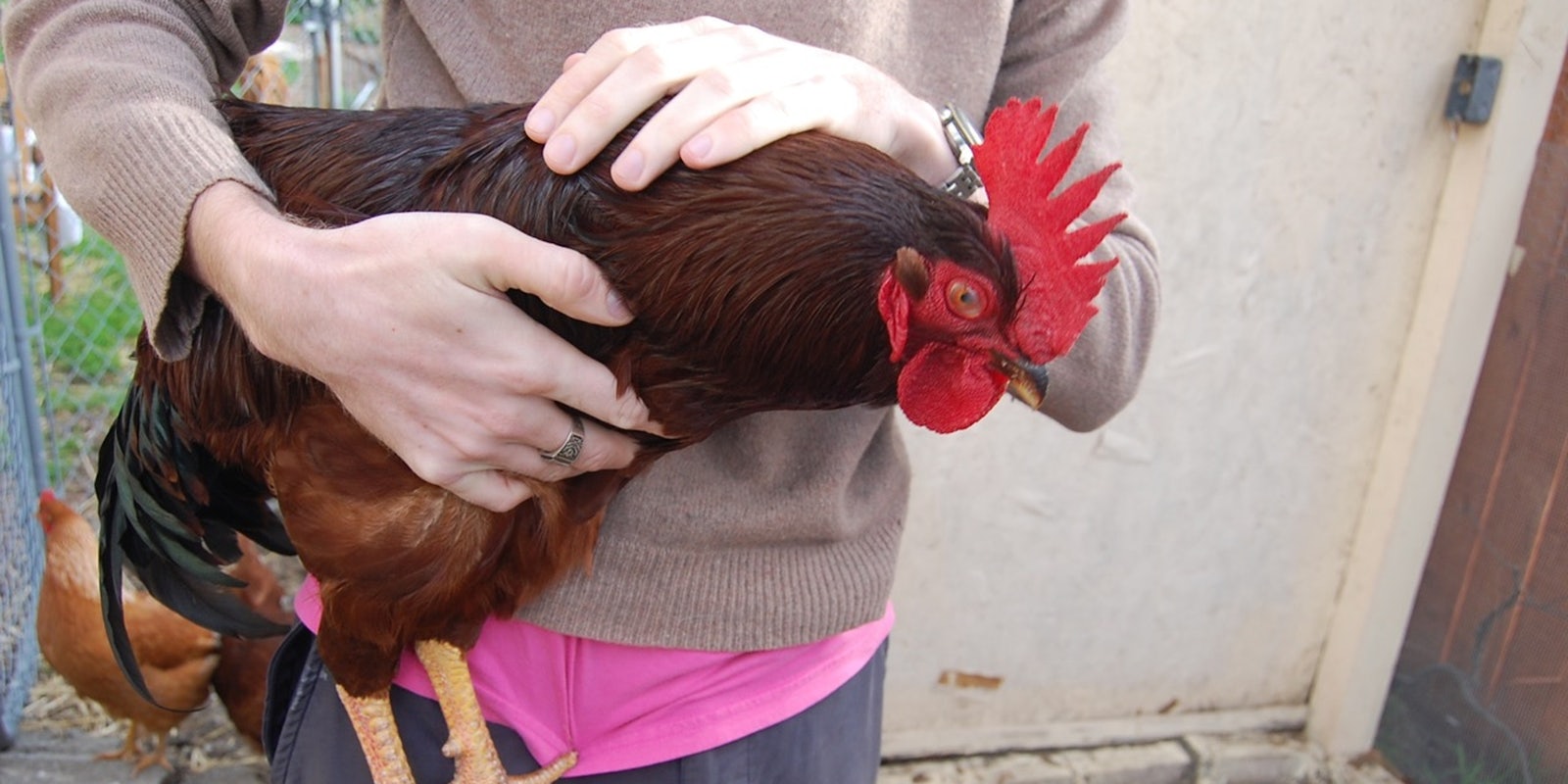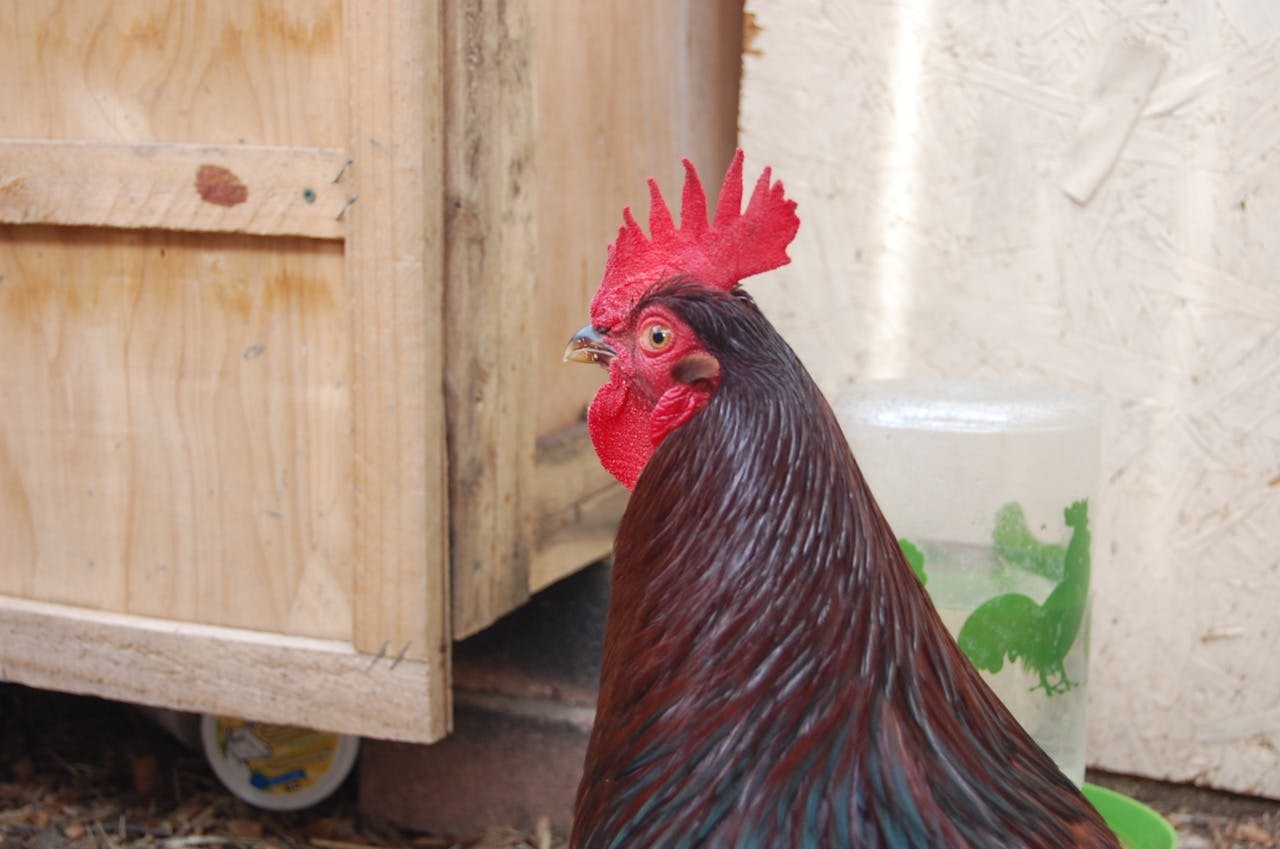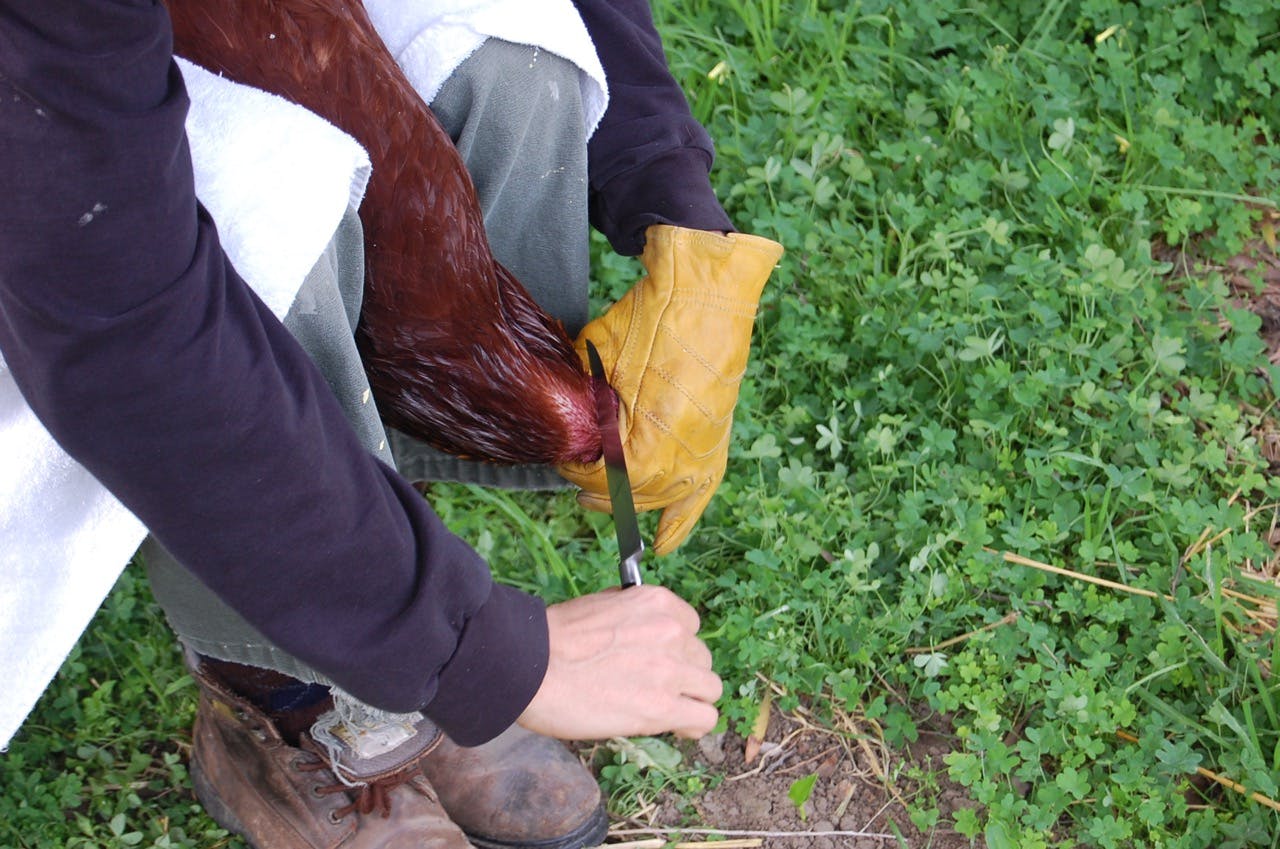I matched with Andrew on Tinder and made first contact.
His photos included no fewer than two farm animals and a quote from The Magic School Bus’s Ms. Frizzle, which made it easy to swipe right. I initially messaged him about the goat in one of his photos, but the conversation quickly turned to his four egg-laying hens named after Dorothy, Blanche, Rose, and Sophia from the Golden Girls.
“Dorothy turned out to be a dude so he’s gonna have to get eaten. The neighborhood doesn’t take kindly to roosters. We’re having a chicken dinner in March. Sorry Dorothy,” Andrew wrote to me.
It’s not that uncommon to get a surprise rooster in your henhouse. Chickens are difficult to sex at birth, so sometimes experts even get mixed up, according to Forbes.
I didn’t expect it then, talking to Andrew on Tinder, but I would eventually be one of the people to be with Dorothy in the final moments of his life.
I should note that Andrew did not suggest the idea of watching him and his roommate, Colin, butcher Dorothy—it was actually my idea. It was our fourth date, not our first, but still not your traditional early hangout. We had done the usual things first: go for a hike, get drinks, collect and examine microbes through some microscopes.
Initially, Colin was going to make a Tinder date of his own be part of processing Dorothy, at her suggestion, and Andrew and I joked that we should make a date out of watching Colin’s date. But on the eve of Dorothy’s date with destiny, Colin’s date backed out. (In Colin’s words, she “balked.”)
Andrew and I decided to go for the kill. I was sort of curious about the whole thing, and while I’ve never killed a chicken, I’m not exactly squeamish. In a previous life, when I worked in various research labs, I had to do some grisly things to animals in the name of science. And, as a meat eater, I was curious to see what it means to prepare your own food—start to finish.
(Slaughtering your own livestock in your backyard isn’t exactly legal in Oakland, California, where Andrew and Colin live. I’m not disclosing their last names to protect their identity.)
The big day
I came to Andrew’s house early on Sunday morning. It was sunny and warm enough to wear sandals, a decision I’d later regret. Andrew had on a brown sweater and some grey pants. He was wearing small wire-frame reading glasses while he was doing his taxes. I had never seen him in glasses before—I told him I thought they were cute in an old-timey sort of way.
I invited myself into the chicken coop with my camera to take some pictures of the chickens. After helping Colin set up for the main event, Andrew met me in the coop. I was struggling to get some nice photos of Dorothy while also keeping Rose, Blanche, and Sophia from pecking my bare toes. Andrew picked up Rose and showed me his favorite game to play with her—gently tossing her across the coop and letting her flutter down to the ground. She came running right back for another round. How cute, I thought, like when I’ll rub my cat’s belly for a game I like to call “scratchy bitey.”
Andrew also grabbed Dorothy to help me take a few photos. But soon enough, Colin said he was ready to do the deed. We handed Dorothy off to him as we exited the coop. I stood uphill of Colin to be sure I wouldn’t get splattered with any blood.
Things quieted down we watched Colin ready Dorothy on his lap. He had experience slaughtering chickens, but he had never slaughtered a rooster. He relied on YouTube to teach him what he needed to know—citing the visual guide as being more helpful than a written one. There he found the Chicken Lady, Alexia Allen.
(Warning, Allen’s tutorial video is graphic.)
Colin said he turned to Allen’s videos because of her emphasis on respecting the animal while maintaining some emotional distance.
Our nerdy flirting was cut short by Dorothy, who began to struggle in Colin’s lap.
I reached out to Allen to talk to her about the ethics of raising and eventually butchering livestock. Allen herself was once a vegan, but after a particularly grueling day in her old field biology job, she couldn’t say no to some beef jerky. She said her body started craving meat again, so she decided to find a way that she could nourish her body with meat in a way that she could morally abide.
“The answer is, for me, to do the processing. To know what that is, to do it intimately, and to do it as well as I can,” Allen told the Daily Dot. “I butchered my first chicken in 2002, and it took me all day.”
Now it’s like second nature. Allen teaches classes on butchering chickens to her community in Washington state. She said that she is often given chickens to butcher and eat as well if the family keeping them can’t or won’t butcher the animal themselves. Allen doesn’t judge people who do that, since it benefits her, and many people take on chickens as pets rather than livestock. But, when taking on any domestic animal, she said, it’s important to consider what will happen at the end of their life.
“We don’t get to decide if these animals die, just like we don’t get to decide if we die or not. With the animals, as part of the domestication alliance, we just get to decide, if we choose to, how and when they die,” Allen said.
For her, the most humane, intimate, and respectful way to kill a chicken involves holding it in her lap and slitting its jugular, letting it bleed out, then breaking its neck. Doing this is no easy feat, she said. You need to have conviction, a sharp blade, and a steady hand. Most of those things come with experience.
Colin, despite his experience, still had some trouble with Dorothy. It took him a little time to find the jugular in the first place due to Dorothy’s extra waddle—the red comb and flesh that roosters have in abundance. While he searched for it, I decided to lighten the mood.
“Do you think dinosaurs tasted like chicken?” I asked. We laughed about the idea, and wondered aloud if dinosaurs crowed and had waddles like roosters do. Then Andrew and I nerded out about dinosaurs—particularly how you can trace their evolutionary history through the orientation of their hip.
Our nerdy flirting was cut short by Dorothy, who began to struggle in Colin’s lap.
Andrew moved in to hold onto the feet, and I continued to watch. Eventually, Colin found the blood vessel, and the whole thing was over almost instantly. Colin brushed the dull side of the knife over Dorothy’s throat, to help get him used to the sensation, before turning it over and cutting his throat with one smooth stroke.
No one made a sound as Dorothy’s blood pattered on the ground between Colin’s feet. With a little effort, Colin was able to snap the neck.
Then he scalded the carcass in a pot of very hot water, to loosen up the feathers. The two guys went to work plucking feathers from the chicken and I mostly watched. At this point I was feeling squeamish. I was more wondering about the germs I could be exposing myself (and my bare feet) to. I wondered if my discomfort might make me seem less cool in Andrew’s eyes.
On eating (less) meat
Colin said, for him, the ethics of eating meat are very near and dear to his heart.
“I’ve been phasing out grocery store meat for about seven years now. I used to say I would only eat meat if it was free range and organic, but I don’t think those standards are good enough,” he wrote to me in an email a few days after processing Dorothy. “I’ll eat an animal if I trust it was raised and killed with care and compassion. Usually that means I’ll eat it if it’s from a farm I’ve heard of and that is known to have high standards.”
Andrew tends to avoid meat for environmental reasons. He said he was a vegetarian for a good portion of his life. Ultimately he distanced himself from vegetarianism and veganism because he doesn’t think that will help the world change its eating habits.
“Life is complicated, and complicated environmental problems aren’t solved with simple rules,” he wrote to me in an email. Instead, he eats less meat. He actually advocates eating bugs like crickets and termites, as they take fewer calories to raise and provide more calories as a foodstuff compared to typical meats like beef and chicken. He hasn’t gotten me to try them yet.
As for me, well, I’m not nearly so discerning. I eat meat in most of my meals. I buy whatever chicken is cheapest in the store, though I go for antibiotic-free when I can. Antibiotics in livestock contribute massively to antibiotic-resistant bugs, and I try not to support that. But the environmental impact of my meat habit concerns me. I avoid beef mainly because I don’t care for it, but also because meat is a huge contributor to climate change. Between the land, water, and methane emissions from the animals—particularly beef—not to mention the ratios of calories to raise the animal versus calories it creates, eating meat is not one of the nicest things you can do for Mother Earth.
After it was all said and done, Andrew asked me if I would ever choose to wield the knife myself.
On the other hand, small-scale farming isn’t necessarily the answer. Particularly when it comes to chicken. Most chickens—backyard or not—are fed with grains that had to be grown somewhere, according to the New York Times. And those grains likely contribute to climate change in their own way, mainly through soil erosion and the deforestation required to make the fields to grow those grains in. There are alternatives, like feeding chickens on table scraps and other, more sustainable foodstuffs, but there’s just no such thing as a free meal.
That all said, it’s certainly a lot easier to get more milage out of a single chicken if you’re the one raising, butchering, and preparing the beast. From eggs for food, to manure for fertilizer, to the meat, bones, and feet of the bird—there’s a lot you can do with chicken. And, when it’s your own, it arrives in one neat package instead of broken into parts—some of which you might have to ask for special from your local butcher or grocer.
Once the carcass was plucked, Colin set about to removing the internal organs and separating the edible bits like the liver and kidneys from the non-edibles like the gall bladder. Andrew and I were playing with the feet in the sink, tugging on the tendons to make the toes curl up. Romantic, right?
Eventually we took the skin off the feet to save them for something later—probably broth, but maybe pickling. I took a photo of the partially de-gloved foot and Andrew and I had a long debate about the appropriate Instagram filter for such a grotesque photo. I settled on Brennan, with the tilt-shift feature focused on the center toe. Andrew would later like the photo on Instagram.
Once it was all said and done, I was strangely ravenous, as was Andrew. We started to make scrambled eggs, corn, and garlic to go with some tortillas. Then we decided to throw in some of the liver Colin had just pulled out from Dorothy.
That was when it got weird for me, and not just because of the liver’s oily texture. Though many take more comfort in knowing where their food comes from, I had become so accustomed to my willful ignorance that it was a little unnerving eating the liver of a chicken I had just watched die less than an hour prior. Maybe I was focused on this thought because plain, sauteed chicken liver and scrambled eggs isn’t exactly gourmet.
After it was all said and done, Andrew asked me if I would ever choose to wield the knife myself. I said I probably would do it, but if someone volunteered to do the deed in my place, I wouldn’t hesitate to hand off the challenge.
Killing a chicken didn’t kill the magic. Andrew and I went on a fifth date—this time to your more run-of-the-mill art museum. There are more dates in our future—though hopefully we’ll be watching the Golden Girls while the remaining gals enjoy their lives in Andrew’s backyard.
Photo by Cynthia McKelvey




